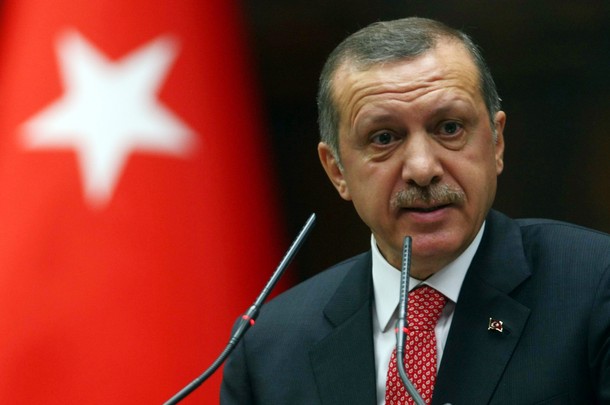Four days after Syria’s downing of a Turkish F-4 fighter aircraft, the government of Prime Minister Recep Tayyip Erdogan brought the crisis to a close by securing NATO support, reporting its views to the UN Security Council, complaining formally to Damascus, and altering the rules of engagement along the 500-plus mile border with its neighbor to the south. Both militaries may now be somewhat more visibly at loggerheads.
It also seems clear that at least on Turkey’s side three existing lines of policy will remain: support for the Syrian opposition will be unaffected; efforts to coalesce a stronger regional, Western and international response to the Syrian crisis will continue; and Ankara will not be drawn into an intervention or armed conflict with Syria alone. Whether Damascus follows up its provocative June 22 attack with further destabilizing actions remains to be seen–and will determine whether the Syrian crisis has in fact made the transition toward wider regional violence or remains more largely confined at home.
The Turkish authorities have been coy on the F-4’s mission, but put out detailed flight path information that show the aircraft flew well out into the Eastern Mediterranean before approaching toward the Syrian coast and then disaster. Syrian officials have challenged this, but the Turkish account is presumably corroborated by US and Allied intelligence collected by the NATO Combined Air Operations Commands in the region and US ships in the area. Reading through the reported sequence of events, it seems highly likely that at least on the Turkish side, no one in a position of authority woke up on the morning of the June 22 asking himself what the Turkish military could do to provoke Syria; the flight’s trajectory would seem to reflect otherwise.
Whether Syria’s firing on the F-4 was an intentional or pre-planned poke in the Turkish eye is harder to know. One can speculate that Damascus wanted to warn the Erdogan government not to allow the apparently unfettered aid that Syrian rebels are receiving in Turkey to continue and that the F-4 was, no pun intended, a target of opportunity. Regardless, the reaction by Damascus–fatal shots fired without warning–certainly had the same effect that a premeditated and thoroughly intentional action would have had.
The Erdogan government’s handling of the crisis reflects what is now a decade’s worth of experience in prudent crisis management. A considerable amount of time was taken for the government to piece together what the F-4 was doing, where it went, and what happened. Erdogan himself engaged in intense internal consultations with military commanders over the weekend and by chairing a formal cabinet meeting on Monday, June 25 that was addressed by, among others, the military’s chief of air operations. To convey unity, Erdogan consulted personally (and publicly) with opposition leaders, including an extraordinarily rare meeting with leaders of the Kurdish nationalist Peace and Democracy Party (BDP) that he himself has vilified extensively for alleged associations with terrorist Kurdistan Workers Party (PKK). Erdogan’s public remarks were tough, but surprisingly non-belligerent given his tendency to use extreme rhetoric from time to time. Having worked through that, the government sent a strong protest to the senior Syrian diplomat still in the country, the Syrian consul general in Istanbul, called for Article 4 consultations with its NATO allies, and made its case at the UN, as well.
Rumors circulated some months ago that Ankara was informally seeking Article 4 consultations among NATO members on the situation in Syria. It may not have pushed the matter formally given uncertainty over whether the Allies would agree, a development that would have completely negated the point of the exercise, which was to put more pressure on Damascus and showcase at least some semblance of Alliance unity on the crisis. The F-4 downing provided the mechanism for Ankara to overcome any objections. The statement that followed the North Atlantic Council meeting on June 26 is a strong, but not threatening or bellicose one. It condemned the Syrian action, expressed strong support for Alliance member Turkey, and signaled that NATO and its members will continue to follow the situation closely.
In Ankara the same day, Erdogan declared that the rules of engagement with Syria have changed and that henceforth the armed forces of that country should be regarded as a military threat. The effect of this statement is two-fold. First, it constitutes a stern warning that further Syrian actions against Turkey and Turkish interests, including the now widely-reported if officially-denied support that Syrian rebels are receiving support via Turkey, will be met by a forceful response. Second, the new rules of engagement likely signal clearer civilian government oversight of Turkish military operations anywhere near the Syrian border and therefore in harm’s way. Erdogan may be telling his own military not to provoke Syria–or at least not to do so in perhaps unintended ways and/or in the absence of clear government authorization.
It seems likely that this phase of the crisis is now largely over. Indeed, one Turkish columnist has already penned an article on it entitled “A Well-Managed Crisis Has Been Overcome.” What remains to be seen is whether Syria follows up its June 22 provocation with further actions intended either to deter additional Turkish support for the Syrian opposition or signal to Ankara and other regional capitals that further pressure on it will bring with it the costs of wider violence and conflagration.
Ross Wilson is director of the Dinu Patriciu Eurasia Center at the Atlantic Council and former United States ambassador to Turkey (2005-08) and Azerbaijan (2000-03).
Image: erdogan_3.jpg
